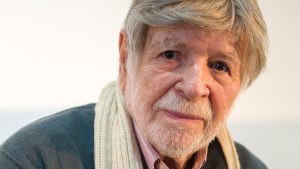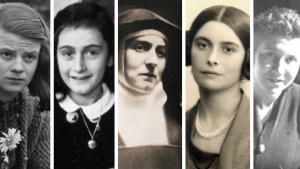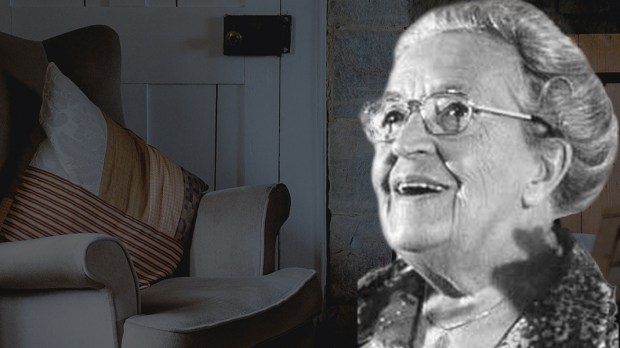Corrie ten Boom was an exceptional woman even before Nazis invaded her homeland and she joined the underground fight against them. At age 30, she became licensed as the first female watchmaker in the Netherlands, having learned the trade from her father. She also learned from her parents to be a devout Christian, deeply immersed in Scripture. In the years before the Nazi occupation, she dedicated much of her time to service, including running a youth club for girls and volunteering for charities for children with disabilities.
But it’s what happened after the 1940 invasion that made her courageous Christian witness famous around the world. Along with her father and sister, with whom she lived, ten Boom became an active member of the Dutch Resistance. They built a secret room in their home that was used to shelter over 800 Jewish people and other refugees over the years.
This annex inspired, in part, the name of her autobiography, The Hiding Place; she also chose the name because of a Bible verse that sustained her: “You are my hiding place; you protect me from trouble. You surround me with songs of victory” (Psalm 32:7).
ten Boom built her life on the Bible, so it’s incredibly fitting that the Museum of the Bible is honoring her with a new exhibition. After the war, she traveled to some 60 countries as a speaker and evangelist of the power of forgiveness in Christ. The museum’s collection features a Bible that Billy Graham gave her in 1970 and that she used until her death in 1983, along with information about her life and ministry.

Read more:
Cousins who thought each other had died during the Holocaust, reunite 75 years later
Her faith was put to the test in 1944, when an informant turned in her family, and the Gestapo arrested them along with some 30 others who were gathered at their home for a prayer meeting. Her father, Casper ten Boom, died 10 days later in prison, while Corrie was held for months in solitary confinement and then sent with her older sister Betsie to a concentration camp.
Casper’s noble example greatly affected his daughter, showing the incomparable influence a parent can have. His last recorded words reveal something of the man’s indomitable spirit: In prison, the Gestapo offered to release him because of his age (he was 84 years old); he replied, “If I go home today, tomorrow I will open my door to anyone who knocks for help.” He was told that helping Jewish people could cost him his life, and he replied, “I would consider that the greatest honor that could come to my family.”
Corrie and Betsie were sent first to a political concentration camp and then to Ravensbrück, a women’s labor camp. They had managed to smuggle in a Bible and they used it to pray with other prisoners and hold clandestine worship services. Betsie’s health greatly worsened, in no small part owing to the guards’ brutal treatment and the harsh conditions, and she died in December 1944 at age 59. Before she died, she told Corrie, “There is no pit so deep that God is not deeper still,” words that Corrie treasured for the rest of her life.
Almost miraculously, Corrie was given permission to leave the camp and go home just 15 days later. She found out after the war that she was released because of a clerical error; a week later, all the women in her age group were sent to the gas chambers.
Also incredibly, the six refugees who were in “the hiding place” in her home at the time of the raid managed to remain undiscovered, standing in the tiny chamber without food or drink for days until rescue workers were able to take them to other locations. While in prison, she had learned of this good news, in a coded letter that assured her, “All the watches in your cabinet are safe.”

Read more:
The man who survived the Holocaust by living behind a wall
After losing so much of her family during the war—besides her father and sister, her brother and nephew died after their arrests—Corrie dedicated the rest of her life to the ministry of sharing her faith and her experiences. Perhaps her greatest witness to Christ’s love, however, came in 1947, when a man approached her one day and asked to shake her hand:
On seeing his face she recognized him immediately as one of the most cruel guardians at Ravensbrück, one of the many before whom she had to march naked together with her sister Betsie when, in accordance with the special criteria set up by the Nazis, they latter selected those who were still useful among those who did not serve any more. How could she shake this man’s hands? He told her that he had converted to Christianity after the war and that he believed that God had forgiven him for all the evil he had done at the concentration camp, but that he needed that she personally told him that she forgave him. Carrie did so and shook hands with him.
In later years, ten Boom received many honors for her resistance work. Among others, Israel honored her by naming her Righteous Among the Nations, and a movie called The Hiding Place was made about her life in 1975. She passed away in 1983, on her 91st birthday, which is significant given her connection to the Jewish people: In Jewish culture, it’s believed that to die on your birthday is a special blessing accorded to the righteous who fulfilled their mission on earth as perfectly as possible.
The exhibition is an apt tribute to a woman of extraordinary conviction and unusual strength of character. Hopefully it can help the next generation learn about this heroic woman, and inspire them to imitate her enduring faith.

Read more:
5 Women from the Holocaust who give us hope (Photo gallery)

